Electricity 2
- Consider the electric circuit shown in the diagram below.
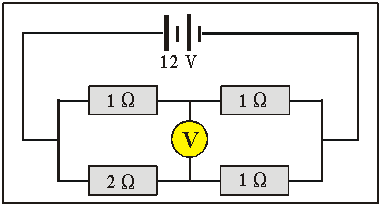
The reading on the voltmeter \(V\) is ...
(A) \(0\; V\)
(B) \(2\; V\)
(C) \(4\; V\)
(D) \(6\; V\)
B is correct
- Two light bulbs \(P\) and \(Q\) are identical in all respects, except that \(P's\) filament is thicker than \(Q's.\) If the same potential difference is applied to each, then …
(A) \(P\) will burn brighter because it has the greater resistance.
(B) \(Q\) will burn brighter because it has the greater resistance.
(C) \(P\) will burn brighter because it has the lower resistance.
(D) \(Q\) will burn brighter because it has the lower resistance.
C is correct
- The ammeter and the battery in the sketch to the right have negligible resistance. The resistors are in parallel. What will happen to the ammeter and voltmeter readings when switch \(S\) is closed?
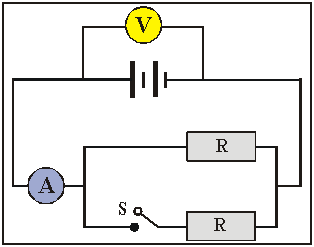
Answer Ammeter Reading Voltmeter Reading (A) increases unchanged (B) increases increases (C) decreases decreases (D) decreases increases A is correct
- In the circuit shown the bulb marked \(2R\) has twice the resistance of the bulb marked \(R.\) Compared with bulb \(2R,\) the current in bulb \(R\) and its brightness compared to the other bulb, is …
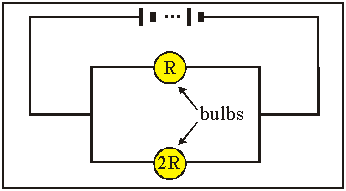
Answer Current in \(R\) Brightness in \(R\) (A) larger brighter (B) larger dimmer (C) smaller brighter (D) smaller dimmer B is correct
- Thabiseng connected four identical light bulbs in a circuit as shown to the right. She observes that the brightness of bulb \(A\) varies if some of the switches are closed. In which case will bulb \(A\) burn brightest?
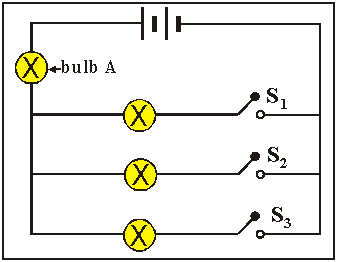
(A) \(S_1\) closed with \(S_2\) and \(S_3\) open
(B) \(S_1\) and \(S_2\) closed with \(S_3\) open
(C) \(S_1,\) \(S_2\) and \(S_3\) closed
(D) \(S_1,\) \(S_2\) and \(S_3\) open
C is correct
- Two identical light bulbs \(X\) and \(Y,\) which are rated at \(60\; W;\) \(240\; V,\) are connected in series to a \(240\; V\) source as shown in the diagram below. If point \(A\) in the circuit is now connected to point \(B\) by a piece of copper wire with very low resistance, how will the brightness of each bulb change?
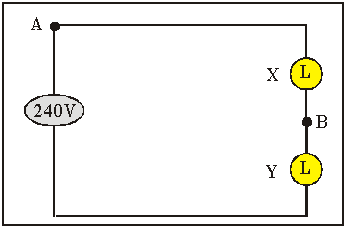
(A) Both \(X\) and \(Y\) will burn brighter.
(B) Both \(X\) and \(Y\) will burn less brightly.
(C) \(X\) will burn brighter and \(Y\) will not burn.
(D) \(Y\) will burn brighter and \(X\) will not burn.D is correct
- A battery is connected to a small lamp. If a second identical lamp is connected in series with the first, what will happen to the current provided by the battery?
(A) it will decrease
(B) it will remain the same
(C) it will increase
(D) it will become zero
A is correct
- A \(200\; V\) electrical outlet is protected by a circuit breaker. The circuit breaker will cut out if the current drawn from the outlets exceeds \(16\; A.\) A \(1000\; W\) toaster and a \(2000\; W\) kettle can be connected to the outlet, either singly, or both in parallel using a double adapter. Which use of the appliances will trip the circuit breaker?
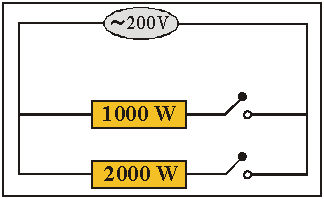
(A) the toaster used on its own
(B) the kettle used on its own
(C) the toaster and the kettle together
(D) none of the above
D is correct
- Two light bulbs are marked \(230\; V;\) \(75\; W\) and \(230\; V;\) \(150\; W.\) If the first bulb has a resistance \(R,\) then the resistance of the second is …
(A) \(¼\; R\)
(B) \(½ \;R\)
(C) \(2 \;R\)
(D) \(4\; R\)
B is correct
- Two resistors of resistance \(2R\) and \(3R\) are connected in series with a battery, which has an emf of \(E\) and an internal resistance \(R.\) What is the potential difference across the resistor of resistance \(2R\)?
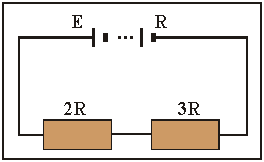
(A) \(E/3\)
(B) \(2E/5 \)
(C) \(E/2\)
(D) \(2E\)A is correct






